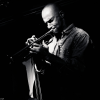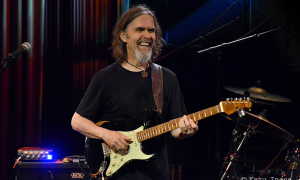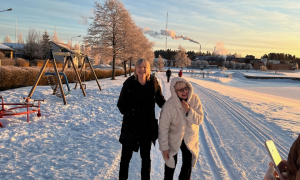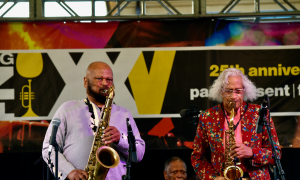Home » Jazz Articles » SoCal Jazz » Erik Palmberg: Swiss Time Was Running Out
Erik Palmberg: Swiss Time Was Running Out

The most important thing is for me to keep evolving as a player.
—Erik Palmberg
All About Jazz: Do you consider First Lines to be a triumphant first record as a leader? How did this record come together?
Erik Palmberg: Yes, I am happy with the outcome of First Lines. I have had many people telling me that they love the album. I really like how people's favorite tunes vary a lot from listener to listener. I've been trying to record some stuff for quite some time, but something always came up, whether it was gigs, personal stuff, or whatever. I finally got the musicians together at the beginning of 2017. We recorded at a very small studio that is actually called "Small House Studio." I thought it would be great to record as a quartet but to also play some tunes in a smaller setting. In that way, the atmosphere and tension are changed. As a listener, you pay more attention. As a player, you choose each note very carefully. We had very few rehearsals. Only one with all four of us. But I knew these guys would make it work.
AAJ: Well, often that can just add to the spontaneity and the improvisational aspect. You composed the majority of the music for this record. Were these songs written specifically for First Lines or are they a collection of material over time?
EP: It is a collection over time. I wanted to record the songs that I've been writing and playing over the past few years. I also chose standards that I thought would fit the album well. "Turn Out The Stars" was one of those standards that I realized would be great to play even if I never had played it live before. I had already played the other tunes live in various settings. For example, a quintet with a tenor sax, or a trio without drums.
AAJ: Your treatment of that Bill Evans tune complemented your own compositions. Your choice of Irving Berlin's "How Deep Is The Ocean" to kick off this album established the sound and paved the transition into your own material. The record has a distinctively modern sound but pays homage to jazz lore. Did you find that a fine line to walk?
EP: Yes, but I think we managed to pull it off. I think that it matters how you play certain songs, that you believe in each song. It feels natural to me because I grew up listening to Miles Davis, Freddie Hubbard, Clifford Brown, Tom Harrell, and others but also to more modern players. Hubbard was my first jazz trumpet idol. I loved his sense of timing and his phrasing. I think I get my message across on the tunes. I love when a record has different types of tunes. The musicians are still the same, but it is interesting to hear them stretch out. Our recording engineer, Erik Lindeborg, had a great sense when he was mixing the record.
AAJ: One of your original compositions that stood out is "The Suspect." Where did that concept come from? Was there a lot improvisation going on?
EP: I wanted to make a solid bass line in unison with the piano that had no minor third in it. So, I created the a line built around the C7sus chord (as in the title "SUS-pect"). At first, I only had that line as an introduction and in the first four bars. But when we rehearsed, the guys and I thought it sounded great to have it throughout the whole tune, except in the final four bars where we have breaks and the piano plays with the theme. The bass line creates an open airy feel even though the tune is a minor blues. I had established a connection with the musicians in other sessions and groups. I knew they were great improvisers and would be comfortable recording with only a few rehearsals. I think it's good not to rehearse too much in jazz. Of course, you need to know the tunes, but to also create a spontaneous feel. The outcome feels fresh and spontaneous.
AAJ: In what part of Sweden were you raised? Were you always surrounded by music, or is it something you sought out? Where do you now call home?
EP: I was born in Stockholm and it is where I now live. Music was very present since my father played trumpet and French horn, and my mother was a dancer. Playing music was a natural thing when I grew up. It was all about having fun: listening to jazz records at home, and trying to improvise and have fun with it. I did study music one year in the north of Sweden and two years in the south. Also, a year in Berlin, Germany.
AAJ: How did you get started professionally?
EP: After playing a lot as a kid, I drifted away for a few years when I was around 12. I wasn't having fun anymore and other things became more important, like hanging out with friends, playing soccer, skiing, and stuff like that. It wasn't until a couple of years after high school that I found my way back to playing music. I was working as an au pair in the French Alps and I had a lot of spare time. I started playing again in my chalet. It became obvious that I would try to start with music again. When I got home to Sweden, I contacted a friend who plays guitar in rock and pop bands and got a chance to play some parties. The first real gig was at the Hard Rock Cafe in Stockholm. Then I got very serious and practiced and practiced and practiced. I got invited to play with some great jazz musicians including saxophonist Ralph Reichert, guitarist Hendrik Meyer, bassist Paul Imm, bassist Lisa Wulff, and drummer Björn Lücker.
AAJ: You have been busy reacquainting yourself with the trumpet since then, ranging from playing with the Glenn Miller Orchestra of Scandinavia to the Hoodlums of Bebop. Tell us about some of the bands and genres you have been involved with.
EP: Yes, a lot of bands and groups. On the one hand, I've always felt that it's a good thing to try and broaden my playing in various musical genres. On the other hand, I feel it's important to keep working on my strengths as an improviser and deepen the jazz language. My focus has always been on jazz-related music. But I like some other diverse stuff. I played on two tunes for the death metal band Cult of Luna on their Eternal Kingdom album. I played the theme on trumpet and low notes on the flugelhorn. I also played some Balkan brass music, Brazilian horn section stuff, and recorded some indie pop trumpet on the Acid House Kings's album Music Sounds Better with You. I had the opportunity to work with Finnish film composer Jukka Rintamäki on the soundtrack for the movie The Lost Fast One. For the past couple of years, I've also played in a number of swing bands. I did a couple of tours with the Glenn Miller Orchestra and I'm a member of The Swingharmonic Orchestra. Older jazz is popular in Stockholm and Lindy hop dancing is getting back in style.
AAJ: Going back to First Lines for a moment, talk about your talented quartet bandmates.
EP: Great musicians. I met Peder Waern when I went to the Royal College of Music in Stockholm. He's a great bassist with a great feel. Drummer Gustav Nahlin and I played in a boogaloo/Latin band and I really liked his diversification. Pianist Anton Dromberg is the young guy in the group. We met playing together in a big band. He's not only a great player but his listening skills really impress me. One of the things I like about the album is that it feels very musical. All the tunes and solos have a dynamic purpose. They're not just to show chops but to be sincere and honest, to tell a story.
AAJ: What is in store for Erik Palmberg in 2019? Are you working on any new projects?
EP: I have several projects that I am involved with. I will focus on gigs with my quartet in the summer and autumn. There are also plans to record with several jazz groups I play with. I'm happy and proud to say that my current focus is on taking care of my young son, Erland.
AAJ: That explains the warmth and sentiment of "Erland's Song" (Track 3 on First Lines). As a still budding player, where do you see yourself in the next ten or twenty years? Will your concentration be more on playing, composing, arranging, or...?
EP: I will be playing my own compositions, as well as others. I certainly hope to release more albums. The most important thing is for me to keep evolving as a player. That has been my focus since coming back from the French Alps and coming home to my trumpet when I was 21. That trip was really the starting point.
AAJ: And also the turning point.
< Previous
Ornettiquette
Comments
About Erik Palmberg
Instrument: Flugelhorn
Related Articles | Concerts | Albums | Photos | Similar ToTags
SoCal Jazz
Erik Palmberg
Jim Worsley
Sweden
Stockholm
Bill Evans
Irving Berlin
Miles Davis
Freddie Hubbard
Clifford Brown
Tom Harrell
Ralph Reichert
Hendrik Meyer
Paul Imm
Lisa Wulff
Bjorn Lucker
Glenn Miller
Peder Waern
Gustav Nahlin
Anton Dromberg
For the Love of Jazz
 All About Jazz has been a pillar of jazz since 1995, championing it as an art form and, more importantly, supporting the musicians who create it. Our enduring commitment has made "AAJ" one of the most culturally important websites of its kind, read by hundreds of thousands of fans, musicians and industry figures every month.
All About Jazz has been a pillar of jazz since 1995, championing it as an art form and, more importantly, supporting the musicians who create it. Our enduring commitment has made "AAJ" one of the most culturally important websites of its kind, read by hundreds of thousands of fans, musicians and industry figures every month.
























